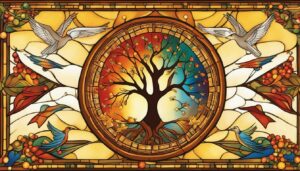As Christians, we know that the Bible is full of rich symbolism that reflects the transformative work of God in our lives. One such symbol is the tree, which appears throughout the Bible in various contexts, each time carrying a deeper spiritual meaning.
From the Tree of Life in Genesis to the tree of the cross in the New Testament, trees are powerful metaphors that offer profound insights into our relationship with God and the transformative power of His Word.
In this section, we will explore the symbolic significance of trees in the Bible and uncover their deeper spiritual meanings. Through biblical verses and explanations, we will unveil the rich symbolism attached to trees in Christian teachings.
Key Takeaways:
- The Bible is full of rich symbolism, including trees that represent deeper spiritual meanings.
- From the Tree of Life in Genesis to the tree of the cross, trees are powerful metaphors that offer profound insights into our relationship with God and the transformative power of His Word.
Trees as Symbols of Life and Growth
One of the most profound symbolic meanings attached to trees in the Bible is the concept of life and growth. Trees represent the abundant blessings that come from God and the flourishing of His creation.
In the book of Genesis, we find the reference to the Tree of Life. Genesis 2:9 states, “And out of the ground the Lord God made to spring up every tree that is pleasant to the sight and good for food. The tree of life was in the midst of the garden, and the tree of the knowledge of good and evil.”
The Tree of Life is a powerful symbol of eternal life and divine wisdom, serving as a reminder of God’s providence and the promise of everlasting life. It represents God’s abundant provision for His people and His desire to bless them with an abundance of life.
“He is like a tree planted by streams of water that yields its fruit in its season, and its leaf does not wither. In all that he does, he prospers.” – Psalm 1:3
Throughout the Bible, trees are used as a metaphor for growth and flourishing. They represent the progress of one’s spiritual journey and the fruitfulness that comes from a deepening relationship with God.
In Luke 13:6-9, Jesus tells the parable of the barren fig tree, illustrating the importance of bearing fruit in our lives and growing in our faith. “A man had a fig tree planted in his vineyard, and he came seeking fruit on it and found none. And he said to the vinedresser, ‘Look, for three years now I have come seeking fruit on this fig tree, and I find none. Cut it down. Why should it use up the ground?’ And he answered him, ‘Sir, let it alone this year also, until I dig around it and put on manure. Then if it should bear fruit next year, well and good; but if not, you can cut it down.'”
This parable reminds us of the importance of growth and bearing fruit in our lives, highlighting the transformative power of God’s presence in our lives.
Trees as Symbols of Strength and Stability
When we think about trees, we often picture their tall and sturdy trunks, their branches swaying in the wind, and their leaves fluttering in the breeze. This imagery, so deeply ingrained in our minds, speaks to the symbolism of strength and stability that trees hold in the Bible.
In the book of Psalms, the psalmist likens a righteous person to “a tree planted by streams of water, which yields its fruit in season and whose leaf does not wither–whatever they do prospers” (Psalm 1:3, NIV). This verse suggests that just as a tree remains firmly grounded and bears fruit, a righteous person is unshaken by life’s challenges and experiences spiritual growth, continuously producing good works.
The prophet Jeremiah also draws upon the symbolism of trees, saying, “But blessed is the one who trusts in the Lord, whose confidence is in him. They will be like a tree planted by the water that sends out its roots by the stream. It does not fear when heat comes; its leaves are always green. It has no worries in a year of drought and never fails to bear fruit” (Jeremiah 17:7-8, NIV). This verse emphasizes that trusting in God allows us to remain firm and unmovable, even in times of trial and adversity.
“Trees have deep roots that anchor them firmly in the ground, providing stability during storms and trials. This symbolism reflects the steadfastness of God and His ability to provide us with strength in times of adversity.”
Furthermore, the symbolism of trees extends to God’s faithfulness and strength. In Isaiah 61:3, the prophet speaks of the Lord’s promise to “provide for those who grieve in Zion–to bestow on them a crown of beauty instead of ashes, the oil of joy instead of mourning, and a garment of praise instead of a spirit of despair. They will be called oaks of righteousness, a planting of the Lord for the display of his splendor” (NIV). This verse highlights the Lord’s ability to transform our pain into beauty, just as a tree’s roots firmly anchor it in the ground, providing stability and protection against the winds of life.
Ultimately, trees in the Bible remind us of God’s unwavering support and the firm foundation we can find in Him. Just as a tree relies on its roots for strength and stability, we can rely on God’s promise to never leave us nor forsake us (Deuteronomy 31:6). As we face the trials and tribulations of life, may we draw strength from the symbolism of trees, anchoring ourselves firmly in God’s Word and finding stability and protection in His loving embrace.
Trees as Symbols of Knowledge and Wisdom
In the Bible, trees are often used metaphorically to represent knowledge and wisdom. Just as trees bear fruits, the pursuit of knowledge and wisdom leads to spiritual growth and understanding. The book of Proverbs, for example, states:
“Joyful is the person who finds wisdom, the one who gains understanding. For wisdom is more profitable than silver, and her wages are better than gold.” – Proverbs 3:13-14
This passage emphasizes the value of seeking wisdom and discernment through tree metaphors, highlighting the transformative power of knowledge and the importance of God’s teachings. In the New Testament, Jesus himself uses a tree metaphor to explain the necessity of spiritual growth:
“I am the vine; you are the branches. Those who remain in me, and I in them, will produce much fruit. For apart from me you can do nothing.” – John 15:5
Here, Jesus characterizes himself as the vine and his followers as the branches, emphasizing the importance of staying connected to him for spiritual growth and fruitfulness. The biblical symbolism of trees as sources of knowledge and wisdom serves as a reminder of the transformative power of God’s Word and the importance of seeking spiritual growth through Him.
Trees as Symbols of Spiritual Nourishment
Just as physical trees provide shade and sustenance, spiritual trees symbolize the spiritual sustenance and nourishment that comes from God. In Psalm 1:3, it states: “And he shall be like a tree planted by the rivers of water, that bringeth forth his fruit in his season; his leaf also shall not wither; and whatsoever he doeth shall prosper.” This verse illustrates how trees symbolize individuals who are firmly rooted in God’s Word, bearing fruit in their lives through righteous actions and a deepening relationship with Him.
In John 15:5, Jesus said: “I am the vine, ye are the branches: He that abideth in me, and I in him, the same bringeth forth much fruit: for without me ye can do nothing.” This verse emphasizes the importance of remaining connected to Jesus, the source of spiritual nourishment. Just as a tree cannot bear fruit without water and sunlight, we cannot produce spiritual fruit without being connected to Jesus and His Word.
Furthermore, in Proverbs 11:30, it states: “The fruit of the righteous is a tree of life; and he that winneth souls is wise.” This verse emphasizes the transformative power of a righteous life, which can lead others to spiritual nourishment and growth. By bearing fruit through our words and actions, we can serve as sources of spiritual refreshment and sustenance to those around us, reflecting God’s love and grace.
Trees as Symbols of Spiritual Renewal
As we explore the spiritual significance of trees in the Bible, we come across another powerful symbolism: spiritual renewal. Trees remind us of the cycle of rebirth and renewal that takes place in nature. In the same way, God calls us to experience spiritual renewal in our lives through repentance and a deepening relationship with Him.
In the book of Ezekiel, God promises to restore His people and make them flourish like trees:
“For I will take you out of the nations; I will gather you from all the countries and bring you back into your own land. I will sprinkle clean water on you, and you will be clean; I will cleanse you from all your impurities and from all your idols. I will give you a new heart and put a new spirit in you; I will remove from you your heart of stone and give you a heart of flesh. And I will put my Spirit in you and move you to follow my decrees and be careful to keep my laws. Then you will live in the land I gave your ancestors; you will be my people, and I will be your God. I will save you from all your uncleanness.'” (Ezekiel 36:24-29)
Through God’s grace and cleansing power, we can experience spiritual rejuvenation and find new life in Christ. Jesus Himself speaks of the importance of spiritual renewal in the book of John:
“Very truly I tell you, no one can see the kingdom of God unless they are born again.” (John 3:3)
Just as a tree sheds its leaves in the fall and blooms anew in the spring, we too can shed our old ways and experience spiritual rebirth through our faith in Christ. The Bible reminds us that we are made new through Christ:
“Therefore, if anyone is in Christ, the new creation has come: The old has gone, the new is here!” (2 Corinthians 5:17)
Let us look to the trees as a reminder of the transformative power of spiritual renewal and the hope that comes through Christ’s redemptive work on the cross. As we embrace God’s grace and seek renewal in Him, may we experience the fullness of life He desires for us.
Trees as Symbols of Spiritual Renewal
Just as trees shed their leaves in the fall and bloom again in the spring, they symbolize the cycle of renewal and rebirth. In Isaiah 55:12, it says, “You will go out in joy and be led forth in peace; the mountains and hills will burst into song before you, and all the trees of the field will clap their hands.” This verse speaks of the joy and renewal that come from being in God’s presence.
“But blessed is the one who trusts in the Lord, whose confidence is in him. They will be like a tree planted by the water that sends out its roots by the stream. It does not fear when heat comes; its leaves are always green. It has no worries in a year of drought and never fails to bear fruit.” – Jeremiah 17:7-8
In this verse from Jeremiah, the tree is used to emphasize the importance of trusting in God. Just as a tree planted by water can withstand drought and bear fruit, those who trust in the Lord can find resilience and renewal in difficult times.
The symbolism of trees as sources of spiritual renewal is also reflected in Psalm 1:2-3, which says, “But whose delight is in the law of the Lord, and who meditates on his law day and night. That person is like a tree planted by streams of water, which yields its fruit in season and whose leaf does not wither—whatever they do prospers.” This verse emphasizes the importance of meditating on God’s Word and finding spiritual nourishment in it, leading to growth and flourishing.
In Conclusion
Through their symbolism of renewal and rebirth, trees remind us of God’s ability to bring growth and transformation to our lives. By trusting in Him, meditating on His Word, and seeking spiritual nourishment, we can experience the renewal and flourishing that come from a relationship with Him. Let us stay rooted in His teachings and find renewal in His love and grace.
Trees as Symbols of Flourishing Righteousness
As we continue to explore the spiritual symbolism of trees in the Bible, we come across the powerful imagery of trees as symbols of flourishing righteousness.
In Psalm 1:3, it is written: “He is like a tree planted by streams of water, which yields its fruit in season and whose leaf does not wither. Whatever he does prospers.” This verse illustrates the importance of being firmly rooted in God’s Word, drawing nourishment from His teachings, and bearing fruit in our lives through righteous actions.
“For they are like trees planted by the water, bearing fruit in season, with leaves that do not wither, and everything they do will prosper.” – Jeremiah 17:8 (NIV)
The symbolism of trees as symbols of flourishing righteousness emphasizes the rewards that come from living a life aligned with God’s teachings. When we remain faithful to His Word, we cultivate a fruitful life that blesses others and brings glory to Him.
The Fruit of the Spirit
In Galatians 5:22-23, we learn about the fruit of the Spirit: “But the fruit of the Spirit is love, joy, peace, patience, kindness, goodness, faithfulness, gentleness, self-control; against such things there is no law.” This passage highlights the importance of cultivating these qualities in our lives, as they reflect the character of God and demonstrate the transforming work of the Holy Spirit within us.
Just as a tree bears fruit, we too can produce the fruit of the Spirit in our lives through a deepening relationship with God and a commitment to living out His teachings. When we bear these fruits, we become beacons of hope and light in a world that desperately needs it.
A Life Aligned with God’s Word
Living a life aligned with God’s Word is not always easy. We may face challenges and temptations that threaten to lead us astray. However, when we remain rooted in Him, drawing strength and nourishment from His Word, we can experience the flourishing righteousness that comes from a faithful life.
As we seek to bear fruit in our lives and reflect the character of God, let us cultivate the qualities of love, joy, peace, patience, kindness, goodness, faithfulness, gentleness, and self-control. Through the transforming power of the Holy Spirit, may we become trees that bear abundant fruit and bring glory to God.
Trees as Symbols of God’s Creation and Protection
Trees in the Bible signify God’s creation and His protective presence. The psalmist writes in Psalm 104:16-17, “The trees of the Lord are watered abundantly, the cedars of Lebanon that he planted. In them the birds build their nests; the stork has her home in the fir trees.” The trees in this passage represent God’s provision for His creation, providing homes for birds and other creatures.
Additionally, trees often symbolize God’s protective presence and care for His people. In Isaiah 41:19-20, the prophet writes, “I will put in the wilderness the cedar, the acacia, the myrtle, and the olive. I will set in the desert the cypress, the plane and the pine together, that they may see and know, may consider and understand together, that the hand of the Lord has done this, the Holy One of Israel has created it.” Here, God promises to plant trees in the desert as a sign of His presence and protection for His people.
Overall, trees in the Bible serve as a reminder of God’s creation and His watchful care over His people. They represent His provision and protective presence in our lives, and remind us of the blessings He continually bestows. As we seek to deepen our faith in God, may we find comfort and strength in the symbolism of trees in the Bible.
Trees as Symbols of God’s Creation and Protection
As we conclude our exploration of the symbolic meanings of trees in the Bible, we are reminded of the significance of these magnificent creations of God. Trees represent God’s handiwork and His protective presence in our lives. In Psalm 1:3, it is said that, “He is like a tree planted by streams of water, which yields its fruit in season and whose leaf does not wither. Whatever he does prospers.” This verse shows that when we are rooted in God’s Word, we can flourish and prosper in all that we do, just like a tree that is constantly nourished by a stream of water.
In addition, trees also serve as symbols of God’s protection and provision. In Isaiah 61:3, it is written, “They will be called oaks of righteousness, a planting of the Lord for the display of his splendor.” This verse emphasizes how God’s people are like trees that He has planted, and that they will display His splendor through their righteous actions. Trees also provide shelter and sustenance, just like how God offers care and protection to His people.
As we reflect on the intricate symbolism attached to trees in the Bible, we are reminded of the majesty of God’s creation and the importance of staying rooted in Him. Just like a tree that needs to be constantly watered and tended to, we too need to seek God’s presence and nourishment in our lives. May we draw inspiration from the rich symbolism of trees in the Bible, and find comfort and guidance in the everlasting love and protection of our Heavenly Father.
FAQ
Q: What does a tree symbolize in the Bible?
A: Trees in the Bible hold various symbolic meanings, representing life, growth, strength, knowledge, spiritual nourishment, and God’s creation and protection.
Q: What is the significance of tree symbolism in Christianity?
A: Tree symbolism in Christianity represents the profound concepts of forgiveness, salvation, redemption, and the transformational power of God’s love.
Q: What is the biblical meaning of trees?
A: The biblical meaning of trees encompasses their symbolic significance in relation to various aspects of spiritual and earthly life, including their representation of God’s blessings, wisdom, righteousness, and provision.
Q: How are trees symbolically connected to spiritual growth and wisdom in the Bible?
A: Trees metaphorically represent knowledge and wisdom in the Bible, emphasizing the importance of seeking spiritual growth and understanding through God’s teachings and His Word.
Q: What is the spiritual symbolism of trees in the Bible?
A: Trees in the Bible symbolize spiritual nourishment and sustenance, highlighting the importance of seeking God’s presence and finding fulfillment in Him.
Q: What is the significance of trees in relation to the cross in Christianity?
A: The tree of the cross holds deep symbolism in Christianity, representing Jesus’ sacrifice, forgiveness, salvation, and the transformative power of God’s love.
Q: How do trees connect to spiritual renewal in the Bible?
A: Trees in the Bible symbolize the cycle of renewal and rebirth, reminding us of the importance of spiritual growth, repentance, and restoration in our relationship with God.
Q: What do trees symbolize in terms of flourishing righteousness?
A: Trees represent individuals firmly rooted in God’s Word, bearing fruit through righteous actions and a deepening relationship with Him.
Q: What is the connection between trees and God’s creation and protection?
A: Trees symbolize God’s creation and His protective presence, reminding us of His provision, shelter, and care over His people.





Pingback: What Does Dreaming About Blood Mean as Per Biblical Context - whatdoesbible.com